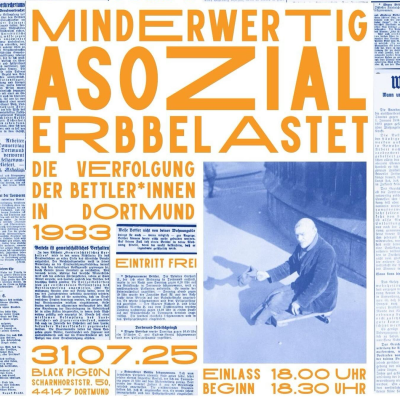Some weeks ago, we met with two members of the Lieferando Workers‘ Collective (LWC) in Berlin and talked with them about their struggles in the gig economy, and with Lieferando, one of the major players in the German delivery sector. In our interview we spoke about lots of interesting topics, we got to know their successful struggle for a workers’ council, the troubles and union busting methods brought up by the management and we tried to clarify what the company actually does, where and how workers are employed and what “dark kitchens” are. Tune in!
All channels of the LWC in Berlin at once.
Email: lwc_berlin /at/ systemli.org
To get an even broader picture of the struggles in Berlin‘s gig economy, we would like to refer you to our recently published recording about the Gorillas Workers‘ Collective, its wildcat strike against the company and things they learned from the experience.
Full Transcript:
A-Radio Berlin:
So I’m here with two members of the Lieferando Workers Collective. And we will be talking about the gig economy, and obviously, in this case about the delivery sector. Could you first tell us about your collective as such?
LWC1:
Yeah. Hi. So the Lieferando Workers Collective is kind of existing for about a year. There were like predecessors, other people, but other names as well. In the beginning, this, the group was attached to the FAU, the Free Workers Union, an anarcho-syndicalist union. There were several changes, but the group as it is now, more or less existed for a year now. And actually, these days, we kind of celebrate our anniversary.
A-Radio Berlin:
And what did happen in this year?
LWC1:
It was basically, you know, like, with these groups, it’s an up and down. And it was last summer, the group was rather small again, but then there were some ideas discussed in the group and some new people coming, which then led to the idea of starting a workers council process at Lieferando in Berlin, which is basically to hold an election to elect a group of workers formally, who then have special rights like termination protection, so they cannot be fired anymore so easily, and they get paid for the work they do.
A-Radio Berlin:
So, this is practically the unionizing process in Germany?
LWC1:
Yeah, it’s like one kind of action that workers and a company can take, like, you know, like workers groups can do a lot of stuff. But this is legally very good protected or standardized. And it’s like something that unions and other structures understand and can work with. It’s not in the favor of every union, like unions have different approaches and stances. There’s, I would say, some criticism towards workers councils from every union, but some unions have more criticism about it.
A-Radio Berlin:
And so, what happened with this process in your case?
LWC2:
Yeah, so I joined collective just over a year ago, and it was a lot of work to start the process. And to start, just get the ball rolling with the election council, which is like the first step to making a workers’ council. And your main responsibility is to hold the election. But as my colleague said, You’re protected legally, you have some extra protections like against dismissal from the company. So, you can use that to your advantage slightly as well, because in the sector, a lot of people are afraid to show their face or speak out, and it gives you a little bit more courage to do that. Because, you know, of course, like they can’t fire you for speaking out, but they can make up another reason. And that protection, like helps you a lot, I think, and especially like telling others more openly about the poor working conditions.
A-Radio Berlin:
So, we will be talking about the problems you also had with this process later on. But maybe you could say some words about the specific problems in organizing in such in part of the economy, the gig economy, that is inherent to your working field?
LWC2:
Yeah, at Lieferando, I can say that it’s really a big struggle to communicate with other colleagues. Because like, first off Lieferando, like, the communication is so bad there that you just, there’s no way for you to get in touch with any of your colleagues unless you go out and find them on the street. And there’s no meeting place. There’s no like, regular event or anything. I mean, there is like a hub in Berlin, where some riders start their shift, but they’re in the minority. Actually, most of the riders they’re spread out all over the city, the star in all different kinds of places, and you rarely meet them, actually, even when it’s busy. And some people don’t want to talk and don’t have time or they’re rushing with the orders. So it’s hard to engage people and try to get you know, try to come together and share our problems and inevitably make our work easier and better.
A-Radio Berlin:
We have been talking before the interview also about how Lieferando is actually structured. We noticed that there are maybe some public misconceptions about that. Could you please tell us how it actually works? Because maybe there’s an idea that riders are actually working for Lieferando mainly…
LWC1:
Yeah, it’s kind of related what to what was said before. Yeah, and misconception is a good word to describe it. Like we as workers actually don’t know for whom we are working and what we are actually doing, why we get paid or like what for and who do address when you have problems. That might be you know, like, we are interacting with different companies like restaurants, but then there’s like some people that rather are supposed to be in the sites the same company but you never know. You know, like one time you talk to this person one time maybe you talk to a different company, and from the I think many workers, delivery workers at Lieferando or other companies don’t actually know for whom they are working. What is this company? And customers as well. And one thing that I try to say as often as I can, is that at Lieferando workers as we are who are contracted by Lieferando, so who are directly employed, only do 5% of the total deliveries. And the rest is done by workers who are not directly contracted by Lieferando. And like normally, it’s 5% of timed workers, so workers that work for a third company, and Lieferando lends them or rents them from that company. This is not so big right now, because there’s not so much orders, because of the crisis and stuff. But then the most orders, like, over 90% of the orders are normally done by what I call restaurant riders or restaurant couriers, workers who are directly employed by the restaurants themselves, and then just deliver the orders that the restaurant is preparing, receiving from Lieferando from the platform, preparing and then giving it to its own couriers to deliver. And yeah, many people don’t know this, that actually 90%, more than 90% of the orders are not done by us. And this, you know, has implications for when these companies say, yeah, all of our couriers, you know, get their work equipment, like a work phone now, let’s say, but it’s not the case, or all of our couriers get unlimited contracts. So, they have like open contracts that do not end automatically, all of our couriers get knows such a wage, this only applies to 5% of the orders that I delivered are actually done by couriers that are unlimited. So, it’s like, you know, it makes me feel like a press stunt, like an alibi. You know, like, I only exist, so Lieferando spends a certain amount of money for like, more privileged and or workers in better work conditions to help portray in the public this image that they are a good employer. They still are not, but this is what people perceive, you know, like, all these companies, sometimes they advertise: ‘You can make 18 euros an hour at us’, which is for just a small percentage, only in very specific situations you can do this, like, if you deliver in one certain area, at specific times or the day on the weekend, then maybe you know, if you’re lucky, and there’s like a rainy day, you can make eighteen euros. But they generalize this to such a degree that one of our group always says this is like should be somebody should sue against this, because it’s wrong. It’s simply wrong.
LWC2:
They advertise this for a long time, especially over the winter when they were trying to recruit new people, because people just leave in winter, because the job just becomes insane, like insanely terrible. It’s like, especially in Berlin, it’s freezing, you would go long hours. It’s not like the summer where you can enjoy it. The winter is just I think unenjoyable. They advertised this 18 euros salary, like per hour, but included the tips in their calculation as well. So, they sneakily include this. And I’ve never made these in euros per hour and I’ve worked a lot and done a lot of hours, cycled fast, cycled slow, tried different things, never got close.
LWC1:
Yeah, and just one short addition is, you know, that they are like institutions like Verbraucherschutzzentrale, that are there to prevent companies from just saying anything they want to market themselves, and to compete against each other. Basically you compete with lies, and you see which lies goes better. I wonder, we as workers, and this is part of, was one of the main parts, I would say, of the Lieferando Workers Collective, we tried to make this public, you know, and we try to speak about it and make people aware that our work is mainly based on lies, going to press doing interviews like this is one part, but it’s a long way. You know, like if every piece of information about your workplace is simply wrong, and you cannot rely on anything just makes it very hard to know where to start. There’s a lot of work to do to improve your conditions, if you have to as well think about how the company talks about your work conditions and sells your work conditions to others.
A-Radio Berlin:
If Lieferando is not employing all these riders, but the restaurants are mostly: What is Lieferando‘s economic model? How do they make money?
LWC1:
That’s, that’s one of my favorite questions. We have talked more about this in the past. Not so much anymore. I hope I get all five of them. But I think that for me, the question is, what am I getting paid for? So, what am I doing actually if I work. I signed this contract and as it stands, I’m it’s says I’m a I’m a courier. I’m a rider sometimes. So, I deliver stuff, but this is like one thing that you could say I’m doing then some couriers, some colleagues, I say, you know, this is much about advertisement, because you see us, you know, we’re like living or moving advertisement, we move through the city. And there’s all over us like this orange and Lieferando. And all these huge backpacks and company bikes if you get them and everywhere, so we are like, basically, advertisement. And there, it already starts: we get quite a few money for this, you know, like if you have like these cars or motorcycles whether you put advertisement as well, they get like 20 euros an hour or something. Whatever are you actually paid for? We are not paid for this advertisement, but we do it, it’s part of our work. Then there’s like a third kind, out of these five, some say: ‘Hey, this is about data’. Like we have these surveillance machines called smartphones in our pockets. And this is our daily phone, there’s this app, which just, you know, sucks data out of these devices and gives it to Lieferando. And we don’t know what happens with this data, what Lieferando does with it. But we know from other companies as well, delivery companies who do the same stuff, who sells this data on to third companies, which then sell the data not only of the workers, but of customers as well, like just sell all the data they can get. And this is highly individualized and like specific data. So, it’s worth a lot. So again, we are not getting paid for this. And then there’s like the fourth, I have to think about maybe it will bear only four, but I’m always forgetting one. But I would say what I’m actually doing and what I paid for is to worsen the work conditions of workers in general. So, I’m getting paid lousy money for making bad work conditions a reality. So, you know, for every worker who agrees to these work conditions, and who has to work for these conditions, you get another worker who’s working in really shitty conditions. So, you get more and more bad work conditions. And this is what I’m paid for: for creating more acceptance for bad work conditions in society. How do you worsen work conditions? It’s mainly your purse, I say, and what I think about is politics. So somehow, you have to go into politics. So, you can spend a lot of money to bribe politicians to weaken laws and create like a precarious market, which was done in Germany, you know, I’m thinking about Schröder, who created Harz 4 and all this bullshit. But you spent a lot of money and you have to talk and it takes time, then you can as well just open advertisement. So like, open lobbying, in the streets, you know, what they’re doing, as well as, and then you spend a lot of money and you hope that, you know, public opinion changes about us. Or you just open the company, and ignore all the laws that you want to be changed ignore the politicians, and maybe do a little bit of this advertisement. But you’ll run a company with work conditions that you want to have. This very direct and very, you know, open. And this is what I see that these companies are doing. And for me, and makes, as well, a lot of sense. Other capitalists and people with money invest into this, because they want in general, bad work conditions, you know, all of them will benefit from it. And all the big companies as well. For me, it does not make sense that somebody else just pumps a shitload of money into a company that with this delivery model, you know, it’s not sustainable, it’s not working, there’s not profit. And then yeah, you can add, okay, if these people are I consider them like as moving advertisement as well who add basically value to my investment. And then I can sell the data as well. But all of this together, like everybody can decide, but for me, it just made sense that if you have the choice to do a lot of lobbying or just run a company, I think running a company and just creating superfast bad work conditions.
LWC2:
I think how Lieferando makes money is quite simply just by exploiting the workforce, because it’s not profitable otherwise. They can’t charge that little money to the customer and to the restaurant, and still pay a fair salary to the riders and give the workers like everything that they need to work and still make a profit. The numbers just don’t work out. And even when you do the numbers and you remove like this data thing, let’s pretend they don’t sell the data, it’s really hard to see how they would make any money anyway. And if you check their sort of profit and loss statements and all the stuff, they have made one year recently, they made a profit. But the last, don’t remember know, but there’s been like two or three years out the last four years where they didn’t make a profit at all. So they’re basically like losing money and growing and trying to change tactics a little bit. I think it’s coming or that they’re going to actually make our working conditions worse so that they can try to get some of that money back. And they’re basically been sustained by millions and millions, if not billions, of foreign investment coming from other countries in states and it has like huge effects here as well. Not just for the work conditions for us, but for other workers as our salaries or maybe paid one euro more than the local cafe. And then people jumped to Lieferando to make a little bit more money and maybe have like a little bit more flexibility with the hours or something like that. And slowly these local places start to struggle to find like cheaper labor as well to work there.
A-Radio Berlin:
Okay, but Lieferando also has another business model. Right?
LWC1:
Yeah. Which is related and which is part of it, but it’s not in the publicity, people are not so aware of it. There’s like this internet site, which is called ‘platform’ where they just try a lot optimization. So, people find them on the internet and shop over the website and make it easy and nice for people to spend money there. And they actually sell a lot of these services, like this service and others, to their customers, which are restaurants as well, which sometimes they are called partners. We are sometimes called partners as well at some companies. So, they sell having a nice looking website to a restaurant or having like, search machine optimization. All the technical stuff that restaurant owners might not know about. It’s not only this, maybe that started, it’s getting more and more that basically every aspect of running a company, Lieferando starts to make services out of it. So, you see, from the sign that you have in the doors, if the restaurant is open or closed, Lieferando supplies this, or like clothing for the cooks, for the chef’s. The paper napkins as well. And other accessories or equipment in the restaurants, and this is getting more and more. And I wonder, you know, when Lieferando or these other companies will go so far that they actually sell all the supplies of a restaurant including like the food to prepare the meals to the restaurants. So, in the end we know that they’re working on it, because there’s more and more talks about these dark kitchens. Dark kitchens are like restaurants without customers or restaurants where chefs just rent the place and get all the equipment. On from those companies you will find articles that they’re dreaming of big halls and warehouses where you have dark kitchens side by side. So, like you have an Asian place, an Italian place, Russian food, Polish food, and it’s all in one big warehouse. And this is like where all the deliveries have been happening from and where all the food is delivered and the meals just get produced from someone who’s then badly paid. So, there’s like a process of making these restaurants more and more dependent on these big platform companies and what they are selling as well to companies who are like small and maybe you don’t want to have this hassle, you know, like with paying your workers or like all this administrational stuff is the payment and the paperwork so that workers get that payslips and the times are recorded. Most of this is done through the app. And if you have time scheduling and recording and tracking of the workers, and all this, you know, the restaurant would have needed to take care of. But then here comes Lieferando and they say: ‘Hey, we do all this for you. And you just pay for 30 or 40% of the meal that you prepare, and we do all the rest for you.’ So more and more services are thereby outsourced by this restaurant, and the restaurants become more and more depending dependent on these big food delivery companies.
A-Radio Berlin:
So, what you’re saying is that Lieferando has a very small own workforce of riders. Most riders are actually employed by restaurants, but restaurants then take the services of Lieferando to do the invoicing and everything?
LWC1:
Yeah, I personally haven’t seen this invoicing. So, it’s like stuff I heard from other people as well. But what I know from other couriers, they sure use the same app, so they get the orders. And from the orders the invoicing is done to a certain degree as well through these apps. The tips, for example, are done through this app and all the time recording when you work and how many orders you did. So, it’s all there. Yeah, just another aspect that Lieferando is taking over. At that point you can think about what are these restaurants actually? Are they like, partners? I don’t know what partners even means. But for me, they are like subcontractors of Lieferando, like they are not independent. They’re basically doing services for Lieferando. And this all, you know, sometimes hurts in my head to understand what is going on there. Because it’s so twisted, and the words are not suitable to describe the actual situation, the words that Lieferando is using.
A-Radio Berlin:
Okay, so then let’s come back to the workers council as the latest attempt, also, from your part to enhance the possibilities maybe for a struggle for workers’ rights inside the company. What was the process concretely and what were the problems that appeared?
LWC2:
Yeah, lots of problems. I think like I mean, first of all, we started as a workers collective. And so the words council is ideally a tool that we can use to help us push for better conditions in the company. So, we don’t like view, at least in the Lieferando Workers Collective, the council as the main body, it would be like a sub body. To that it was a long process, like, first of all, we had to initiate the election council. So, we were appointed the election council by the Gesamtbetriebsrat. Because Lieferando already has a council or several councils in different cities. And yeah, then we were appointed us eleven people, which is actually one of the biggest election councils that we know of. It started from there that we need, of course, to have a place to work where we can actually gather all the materials and do everything that’s necessary for the election. That was, I think, about nine months ago. And we still don’t have a place where we can work.
A-Radio Berlin:
You mean a space given by Lieferando?
LWC2:
Yeah, like an office, where we can have meetings. We’re also eleven people, and we still haven’t had the space where we’ve been able to have a meeting provided by Lieferando.
A-Radio Berlin:
And officially they should provide something like that?
LWC2:
Yes, actually, as far as I know we shouldn’t even have to ask them for that, they should just give us it. But we’ve asked them several times. And we did a lot of work as well, on behalf of them like going around and checking out spaces, which was also like kind of in collaboration with the management. So, the actually offered us to come and check out some spaces like ‘here’s this one’, okay, and whatever. But it just turned out to just be games. And then because they didn’t give us anything, they provided us with like a very small sort of subletted space. So, it’s outsourced to a company which rents office space, a room that’s very small, and it has like two desks and two chairs. And that’s it. This was the first hurdle that we really had. But of course, the communication is really bad. It’s clear that it’s not just by accident, that it’s really bad. Right up until recently, we have like email exchanges, where management tell us that they didn’t get the email, or that it was without a signature. And even though we write our names there, or then they reply to the wrong email address, so we have our official email address, which they know and which we tell them about, but then they reply to a completely different email address. Sometimes they change the header of the emails, or has a different title, and just these small things that really affect like the bigger picture. Because if you can’t communicate and get the things that you need to make the election, then it’s really hard to have an election actually. Yeah, and just like also the things that we asked for we never really get there obviously cut corners or just provide like two and we need three or you know, things like that.
LWC1:
Yeah. Basically all this it’s like union busting inside the company. So I as I like to call it like council crushing, but like to stop any kind of organizing or obstruct organizing of workers in the company. It’s happening actually, before there’s even a Betriebsrat. In order you have to understand that there is no council. So, what to obstruct? Obstruct the process of getting there, and you try to, you know, delay it as much as possible and try to get as many people out of the process, by bullying them, by making their work harder, by giving you shitty jobs or just sending your emails, setting up meetings and intimidating you. And this is happening earlier and earlier. So, it’s not happening anymore only in the workers councils, but in the election of the workers councils and even before. These companies nowadays go so far that they -this is what happened at Gettir- themselves initiate the process of electing a workers council. So, there’s like managers or high level employees that say, Yeah, we are now inviting all workers to a meeting to elect an election councils select us as an election council. So basically, the boss of the boss is the boss of yours, wants to be elected to organize a fake workers councils election. So, it’s slowly getting more and more sublime and hard to understand what is going on. And unfortunately a lot of workers fall for this. But then there’s like, you know, what was described before, this soft union busting as well: slow and even more below the radar, but which can result in that we as workers spend about 1000 euro to have an election at Lieferando. And Lieferando by law has to cover all the costs, but they don’t. So, they delay everything. And in the end, you know, we had to buy stuff on our own because there are deadlines, legal deadlines, which we had to fulfill. We had to buy the envelopes to send out the postal ballots. We had to go to a copy shop to print all the ballot papers, and this piled up to 1000 euros, you know, and this is a huge burden. And luckily, we are a large enough group. So, several people could share in these costs. Other workers couldn’t have done this, you know, there would have been no election. But this is exactly the goal to stop this process or to postpone and delay it as long as possible. And, you know, this can as well be that we had no, there was a printer, but it wasn’t working. And then there’s obviously a problem that, oh, yeah, you will get to this, but there’s this and that problem, or we have to check back with our IT department until you get a printer. And you know, like you’re talking to a company that has 10,000 workers in Germany, and they’re not able to provide a printer, or stamps even simpler, you know, like, we were asking for stamps. And then it was like: ‘Yeah, but why do we need so, so much envelopes, this amount of envelopes, and that amount of stamps’, and you’re like ‘this is absolutely not related. We just need stamps and envelopes’, you know, but they make up problems, just to send another email back, you know, delay this process even further. For me, the most absurd example was some day we got like one laptop that we could work with. And even months later, we got a display, a monitor that was supposed to be for this laptop. But unfortunately, we couldn’t connect both because there was not the right cable supplied. And then we had to explain to Lieferando and they said: ‘give us the details and the arguments. Why do we need a cable?’ So, unfortunately, I don’t know how courts and again, society can consider this reasonable or if it would talk in terms of legal and illegal, it’s just wrong. But this is part of what we are facing, you know, like, I think we can laugh about it and smile when it’s like, you know, we talked about cables and stamps, but in the big picture what happened at other companies as this is about talking about our life, you know, like at Gorillas and Gettir, and Flink. Workers are getting fired just for talking to their colleagues. They are not even getting fired, they just get no money and then they cannot pay their rents. This has big implications. Workers are facing huge problems. And neither from the legal side nor from society I can see an adequate reaction to this. It’s massively wrong to treat your workers in such a way of respectless, and like threatening the lives basically, you know, if you take money from us, we have to struggle. We don’t know how to pay our rent or food this is life threatening. And there is no- I don’t see an adequate reaction. How comes that bosses can do this? If I come five minutes too late, or, you know, like a person on the counter in a supermarket takes the bottle money, they get fired. I don’t know if I have been paid, right one single month. And I know so many colleagues who haven’t, and nothing happens. And again, I’m not only talking about the legal side, no, there’s much more than this is accepted by society. Like you know, this, these people who do this deserve no respect. They don’t deserve, you know, like a big villa and a yacht and something now they deserve to live in a shithole and be treated like shit.
LWC2:
So, I would like to just talk a little bit more about the communication thing. So, we didn’t really end up with a good way to communicate with the workers and Lieferando is legally supposed to give us that we just ended up with a one way communication system, which was an email list, which was sent to all, so we could communicate only by email, and go out to all the workers. And that was how we could inform them about the election. But we know for a fact that not all of the workers got the email. And if the reply to the email, it’s not really sure where it ends up. And it’s just it’s more like a one way communication channel, which is not really beneficial. Because if people have questions, it’s hard. So, we always try to give our email address in the email, which of course is confusing for people. ‘Why do I need to like enter in a different email?’ and so on. At the same time the management were issuing their own messages about the election with their own email address and saying ‘Write to us. We can inform you about the election’. And we have no idea how many people responded to that. And this leads me to another thing, because although we have a lot of internal problems and a lot of internal struggle with the company, we got over a large part of that because of the external network and solidarity network with Lieferando. So, I mean as a start we got a lot of help and support from other workers in the delivery sector like from Gorillas, from Gettir, from Flink and their respective collectives, but also from Right to the City or the tenants’ unions or different anarchist groups who came together and helped us actually go out onto the streets and tell poeple to hear ‘go and vote’.
That was like a really inspiring day, I felt really inspired by that, like, give me a lot of hope, again, that people, people who are not actually working for Lieferando are still interested in bettering the conditions of the workers and see the need to organize and get together and try to change something
LWC1:
I can add to this, because maybe, you know, we have been talking about the bad side and stuff, but a lot of beautiful and really amazing things happened, and were done in the struggle, I think we should as well say, you know, like we are, this is not our struggle, we are part of a larger struggle, and we build on the shoulders of struggles before, like, as what was mentioned, for example, with getting this email list, another election council fought for this and got a ruling in court. And this is why we didn’t have to fight for this as well. And this the election itself, you know, we intentionally put up several voting stations throughout the city, in social projects and house projects and places where we feel good being at and that are as close as possible to the workers, to our colleagues. To bring the election to them and not, you know, bring them once more in their stressful lives into this shitty company. So in order to meet them, where they are, where they’re living, and maybe where they like to do and like to be, and maybe after, you know, this election, they know that as a nice place to be. So we tried to, you know, give immediately something back from the support that we have been getting, and this is what I’m speaking about, you know, like, I don’t have hopes and changing managers, bosses or anything inside the company. But I have hoped that we can change bits and pieces in society. And I think this was the most inspiring, and what we actually achieved, and what gave a lot of energy and synergy, and many people joined in once we don’t dive into this stupid battle of management and answering stupid emails, or their questions for more and more details and arguments and stuff. No, you know, we just do what we are supposed to do, which is an election, enabling voters to enact democracy in the workplace. And we do it in a very open and transparent and outgoing and connecting way, other projects that are struggling as well, you know, struggling, don’t struggle, and thereby we are supporting each other. Yeah, and this was, I think the outcome as well of, you know, years of organizing inside and outside the companies, connecting with other workers that helped us in the company connecting with other workers outside of the company. Last year, you know, several companies went this path, very little companies went the path of establishing workers councils. We supported them back then, like they supported us. So there is a huge and strong connection between workers in the delivery sector, which is making this possible.
LWC2:
Yeah. And to add to that, as well, all of our organizing, a good part of it, was built on the organizing that was done many years ago, like even 20, 30, 40 years ago, where we actually held a lot of our meetings in house projects and social projects. And those places existed because of radical politics like 10s of years ago, and because of that they still exist today. And they enable us to actually, like have a space where we can get together and do stuff, which is just not possible in some parts of the sea, actually, that you think like Charlottenburg, it’s really hard to find the space there to get people together. And it’s kind of the opposite problem in Kreuzberg, and Friedrichshain, Neukölln. But it’s changing a lot as well, these places are disappearing, and it’s really has a knock-on effect as well, I think. Because you might not take that into consideration when you think about people organizing in a food delivery company. You know, ‘what’s that got to do with that?’ You might think they’re not related, but actually they are. And this like, network is like, very deep and goes back very far. And it’s yeah, it’s a little bit sad to see these places disappearing. And it’s just more reason to why we should fight to keep them alive, because it’s goes much further than the project itself. It’s like a huge solidarity network that can spread into different movements. And even for us in the labor struggle.
LWC1:
Yeah, I think, especially the house projects that supported us by just giving spaces, you know, we can’t thank them enough. And this is something I think everyone involved, I hope, appreciates, and thanks these projects for. And as well, if we talk about like time, our energy lifetime, we cannot thank enough all the workers in the company and outside the company that joined even in the last two weeks of the election, and helped us. And this is really inspiring too, even though there are different opinions about this workers council process, and a lot of discussions. In the end, whatever you do, whatever action you take… We have been doing so many actions, different kinds of actions as well, about whatever you do, you talk about organizing to talk about solidarity and support from other people and how to make this possible. Yeah, and this was a very nice experience to see this. And I’m like, you know, with every move forward in the struggle, so far, these connections got deepened and got stronger and more people joined in. So, I’m excited, actually, which will come out of the future struggles.
A-Radio Berlin:
So, I appreciate that you say that the workers council is actually only a secondary thing and the main thing is actually connecting and struggling. And this is more like a tool that can be used. And you actually managed to do the election and to elect the council. Maybe you could say shortly something about the results? And about the struggles that arise from that?
LWC1:
The workers council at Lieferando by size, all these workers councils they are related to the amount of workers that are in a company … This is another maybe fun fact about Lieferando, or these companies. When we got appointed election counsel, there were about 2100 workers in the company. Once we announced the election, we were down to 1700. And when we had the election, a couple of months later, two months later, we went on to 1400, below 1400. So in the process of not even nine months, we lost 700 workers. And we know that most of them didn’t really feel of course they wanted to but they were forced to, again by bullying, mobbing and just not giving them any shifts, telling them stupid stuff. And they were forced to quit, because they just couldn’t stand working anymore. They couldn’t afford it to work anymore the funding because it didn’t get enough shifts in the summer. Yeah. But when we announced and this is the relevant number, we had 1700 workers and this relates to seventeen workers council members. And out of the 17 possible seats we got from our colleagues so many votes that we got 11 seats, which is a majority. And there was another list, which got six seats. And a major success was that there are no superiors in the council. So it’s a courier only council, we are only bicycle riders, Scooter, drivers or car drivers. And there are no superiors in it, which is, I think, the main success for the council in general. But as well, for sure, like for our list, the Lieferando Workers Collective, it’s a huge success. We have the majority in the council, and a lot of seats. So, basically, a lot of us can actually directly benefit from this nine months struggle, and continue to do the great work that all of us have been doing over the last year, we have had basically every month, sometimes every two weeks, we had like public actions, protests and demonstrations, and they were all related to our work. One of the last things was a pool party protest, because Lieferando made a pool party and invited all the administration staff, but explicitly uninvited the couriers. So, I hope after having this project done with the knowledge, information and stability this group is getting through the workers council, we can continue to making good work and connections with our colleagues identifying the issues and problems and addressing them and trying to find solutions. And with the workers council, we have another tool for solutions, a strong one.
A-Radio Berlin:
But the company is still isn’t liking it. What are they doing now?
LWC1:
For sure they are not liking it. They don’t like the main aspect that I mentioned, that there is no superiors. One way to spoil these efforts is that, you know, management just tries to get their friends into the council. Sometimes it goes so far that they redefine the positions of managers, so they make out of managers leading employees. They make normal workers out of them shortly before an election and then it’s like ‘Ah, I can participate in the election, I can be in the council because I’m not a manager anymore’, and they shouldn’t like that we ended up being elected as only couriers. And they, I would say it’s quite obvious and the moment we announced the election, they increased pressure and repression against us and tried to stress us out. And the last two weeks before, or three weeks before the election they were threatening us more and more, trying to call us in for meetings to intimidate us. These threats are still there and increasing and for sure going into the direction of terminating us, getting us out of the company. If you just terminate enough members of the council, then the council is not able to operate anymore. Yeah, and this is where then we are talking about how I go to know union busting, like the classical that you attack directly the workers council members, try to fire them. And even though they are legally protected, the law is never on the workers’ side, and bosses have possibilities. So, this is what is happening now that there is increased pressure and we are threatened to get terminated. Not all of us, but many who were former members of the election council, and they already threatened us not to pay us any more. They make up reasons, why they shouldn’t, why they don’t have to. And let’s see how it goes in the next weeks. I’m hopeful, and I’m hopeful that we can rely on people and networks and support that helped us before. And for sure, you know, I don’t see us being silent about this. But we will push against this as a group and stick together and make the public aware of what is going on at Lieferando.
A-Radio Berlin:
So this was a lot of information. And of course, it’s also an ongoing process. Where can people find more information? And do you have any information channels also available?
LWC2:
Yes, we have a lot, so you can reach us by getting in touch on Twitter, or Instagram or telegram at Lieferando Workers Collective. You can just type it in the search and it should come up as the Lieferando Workers Collective Berlin, because we’re the Berlin group. And there you can find all of our information. And yeah, please reach out to us if you have questions or suggestions or you want to help us.
LWC1:
Yeah, and we have like a one internet address, which is kutt.it/lwc_bln. Or you just search on Twitter or on Instagram for the Lieferando Workers Collective Berlin. In search engines this should work as well. But if you’ve our shortlink there are all our flyers and invitations to new events, upcoming actions, and our email address, which is LWC underscore berlin /at/ systemli.org.
A-Radio Berlin:
So, in order to finish the interview: Is there anything else you would like to add?
LWC2:
Personally, and yeah, I guess on behalf of the collective would just like to thank everyone that has helped us recently, it’s been really, really inspiring.
LWC1:
Maybe as a last point, what I wanted to say is like a call for help. And speaking about all this repression, and all the stress, we’re having and increasing threats. I would like to invite anyone who has things they can contribute. And you know, in the end, we just need people who want to spend time with us and help us. So, if you are yourself an activist or an artist or journalist, we need a lot of public pressure. So, you will sure have skills that we could need. Again, one skill could just be having time. Yeah. So, we want to motivate you to reach out to us. And we see what we are facing in the future and that we prepare for it. We will surely need a lot of help once more. But I’m excited what comes out of this.
A-Radio Berlin:
Okay, then I would like to thank you both for this interview.
LWC1:
Yeah, thanks very much. I’m happy to end up in A-Radio with the Lieferando Workers Collective.
LWC2:
Yeah. Thanks very much for having us.











